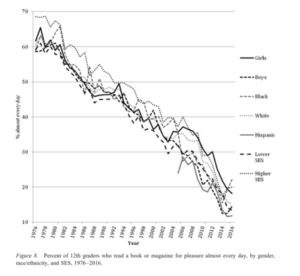06.19.23Looking around during the movie: why sharing stories is important

Where it started…
A few nights ago I was watching a movie with my family. I was in a chair. My wife and one of my daughters were over on the couch. To my left and mostly behind me as I was looking at the screen.
But I noticed a strange behavior in myself: I kept glancing over at them at funny and important scenes. Once in a while when there was a scene I loved coming up I even glanced over in advance to make sure my daughter was watching and not glancing at her phone. Weird. Why would I do that? Why would I care.
In fact though I would wager that you do it too. And I think there are good reasons for it and that they tell us something important about reading in schools.
First why was I looking over at them? Answer: To gauge (and share in) their emotional response. Part of my purpose and part of my enjoyment comes from the shared emotional experience. The movie is a lot better if they are laughing too. If we are laughing together. Or if we share the subtle irony of a key scene. I want to see their surprise when they didn’t see a sudden reveal coming. It’s just like my own when i first watched it. And I was doing this for all the reasons we watch movies with other in the first place. To share the emotional experience. Shared experience enriches the movie and it’s one of the main reasons we are watching the movie together. Shared psychological and emotional experience connects and bonds us.
Stories, Daniel Willingham tells us, are cognitively privileged. We pay special attention to them. This you could argue has an evolutionary basis. For hundreds of thousands of years before there was written language we communicated our knowledge, our cumulative culture and our norms for community & belonging via stories, told sitting around fires. People who listened and learned thrived. People who did not were less likely to. We learned and probably evolved to pay attention when a story was told. And we also probably learned that sharing stories was how we built an ‘us’. Shared stories are critical to belonging.
Why does this matter?
Well for one thing because the book is dying.

Decline in independent reading by 12th graders; 1976-2016 (ie before Tik-Tok and the last round of distraction super engines.
It is in a death struggle against the smartphone and it’s losing. Young people-well all of us–read fractionally as often as we used to. The best hope for the book, for the story lies in its roots—that it is a shared experience. We like stories more and we are more fulfilled when we experience them together-that’s why I was looking over at my wife and daughter. We experience social connection through the shared emotional experience of a story.
If the book has a chance–if we want young people to see a why in reading—one of the best ways we can do that is to leverage the book’s social nature. The pleasure we take from experiencing them together. That after all is where stories started. [I note here that while the book is dying, the book CLUB is thriving. Again: shared experience is at the center of storytelling.]
Two particular takeaways from this. First shared oral reading in class is a way to cause people to connect, to feel connected not just to reading but to each other. Young people need that now. And it helps them to see (and feel) the benefit of stories we share.
You can feel that in this video of students reading aloud together in Maggie Johnson’s English class. There’s laughter and pleasure and connection. Look at the kids furiously underlining while their classmates read. You can hear the enjoyment in their voices.
Second it suggests that the solution many people propose to declining reading rates is mostly wrong. I hear people argue that book choice will encourage students to want to read more. The result of that is often everyone in their own corner of the room reading their own book in isolation and disconnection.
[Side note: the idea that kids who have read ten books in their lives are going to choose better and more affecting stories than teachers will is a big assumption. I love soccer. I choose Cristiano Ronaldo’s biography. It is terribly written and does little to help me glimpse something more true about the world than i previously knew. I doubt I am sold on reading. Better for you to hand me the Giver and for us to read it together, understand a great book deeply, and share in the deep emotions of the final scene].
The solution, I am arguing, is not more fractured isolation and individualism it’s shared culture and connection. Great if kids ALSO get to choose books to read on their own. But more important is to without fail to have shared books that they read and experience together in class so they are connected, and feel belonging and understand that there is something in a book that cannot be found anywhere else. If the book is going to survive it will because we make it social.